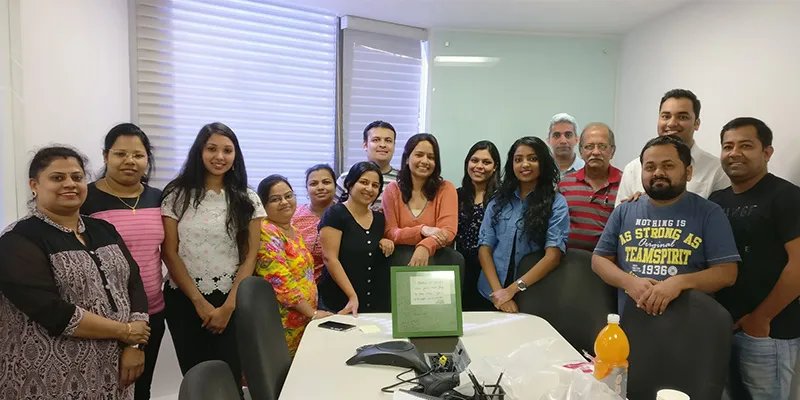Named among top 100 lawyers in India, Manisha Singh of LexOrbis is batting to strengthen legal tech
The growth of online legal services or legal tech is a good sign for the maturing startup ecosystem, and LexOrbis, a 20-year-old IP firm, is making the most of it.
In 2016-17, in all, 9,675 patents were granted, while 250,070 trademarks were registered in India, according to government data. This surge in numbers is good news for the intellectual property rights, especially when compared with past figures of 2013-14, that stand at 4,227 and 67,796, respectively.
Globally too, in the past five years, there has been a “484 percent increase in the number of patents filed covering new legal services technology,” according to data from The World Intellectual Property Organisation.
Besides spelling good news for innovation, these figures indicate the growth of the online legal services, legal tech, if you please. Though still in its early stages, in India, the legal tech sector is going through its own learning curve with some amount of consolidation as more law firms eye boutique IP firms.

LexOrbis, a 20-year-old IP law firm headed by Manisha Singh, recently acquired Bengaluru-based IP firm IPAstra as a part of its expansion plans. In 2015, it had acquired Inolyst, an IP boutique firm led by IP enthusiast Dilip Kumar.
Rise of legal tech
LexOrbis offers expertise in formulating IP strategies, drafting new patent cases, filing, and prosecution of IP applications in India and globally, and strategising and handling IP litigations across the country through a team of 65 professionals, including lawyers, patent agents, and engineers across its offices in New Delhi, Mumbai, and Bengaluru.
The merger will enhance LexOrbis’ capabilities to provide IP services to a wide range of industries, including technology startups, SMEs, and development centres of Indian and global companies in South India.
“When I started my career with a general practice firm around 20 years back, the economic spectrum of the country was undergoing a paradigm shift particularly with the introduction of New Economic Policy of 1991, and consequent opening of the economy for multinational corporations,” says Manisha, who has been named in India’s top 100 lawyers list by the 'India Business Law Journal'.
The IP laws and system in India at that stage were designed to serve the local players who were sparsely using the system. Manisha, along with her other founder partners, conceptualised setting a specialised IP practice firm with the fine blend of legal acumen and technology expertise to assist international players interested in protecting and enforcing their IP assets in India. She adds,
“Though, we were abreast ourselves with the international standards and applied that in our firm, but the ecosystem in which we were operating was not geared to such service model. It was also very difficult for us at that stage to motivate and inspire young engineers and scientists to take up and pursue law as a professional career.”
One-stop shop for legal needs
Belonging to a service class family from Vaishali, Manisha completed her Master’s degree in Economics from Patna University and shifted to Delhi to pursue law from Campus Law Centre, Delhi University. “I started my career as a lawyer and the main motivation behind setting up an Intellectual Property (IP) law firm was the love for innovation and passion to provide the protection to intellectual property, matching the international standard,” she says.

Founded in 1997 as a partnership firm, LexOrbis came into existence as a full-service intellectual property boutique law firm headquartered in New Delhi. “The general practice firm in which we were working was not open to the idea of having a specialised IP practice, complete with technical experts and was ignoring the transitions that were happening in India IP scenario. Therefore, we decided to start out a boutique firm, specialising in IP,” she says.
The firm provides end-to-end services and practical solutions to all aspects of patent, design, trademark, copyright, competition, sports, media and entertainment, unfair competition, e-commerce and other related law. Says Manisha,
“We also have a strong presence in the startup ecosystem too and serve as a one-stop shop for hundreds of startups and individual inventors in protecting their innovations,”
LexOrbis has also partnered with some of the best accelerators, incubators, VC funds, E-Cells of IITs to extend their support to the startup ecosystem.
Opening new areas
The firm has started a new vertical which includes all prior art search and analytics services, global IP prosecution management, IP watch services, patent translation services, invention mining, technology scouting, commercialisation like tech/product/IP/market, partner identification, and regulatory compliance.
“We faced several challenges in our initial days due to the complexities which were there in the administrative and legislative structure at that time but, eventually, efforts started paying off, client sign-ups happened and now we have diverse client base of 1500+ clients that includes many Fortune 500 companies, multinational corporations, public sector organisations, government-funded research institutes, small and medium-sized enterprises and technology startups from a wide range of industries.
According to CB Insights, legal tech startups have raised over $700 million in funding since 2011. Some of the legal tech startups include LawRato, that raised a Series A from Indian Angel Network and UK-based Nitin Singhal in November 2016, Vakil Search, NearLaw, LegalDesk and more.







